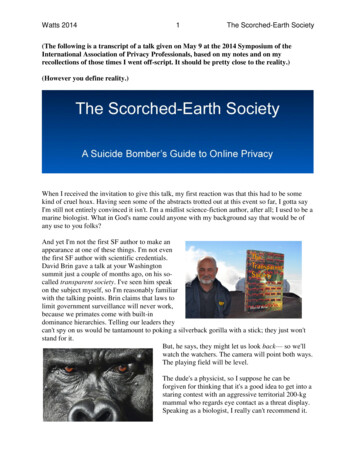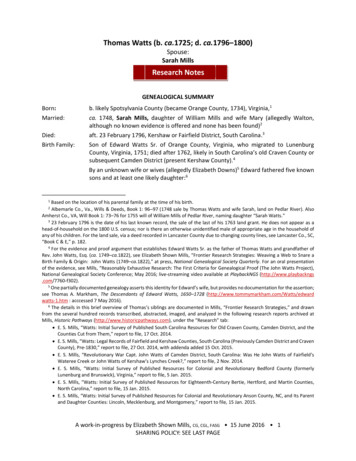
Transcription
Watts 20141The Scorched-Earth Society(The following is a transcript of a talk given on May 9 at the 2014 Symposium of theInternational Association of Privacy Professionals, based on my notes and on myrecollections of those times I went off-script. It should be pretty close to the reality.)(However you define reality.)When I received the invitation to give this talk, my first reaction was that this had to be somekind of cruel hoax. Having seen some of the abstracts trotted out at this event so far, I gotta sayI'm still not entirely convinced it isn't. I'm a midlist science-fiction author, after all; I used to be amarine biologist. What in God's name could anyone with my background say that would be ofany use to you folks?And yet I'm not the first SF author to make anappearance at one of these things. I'm not eventhe first SF author with scientific credentials.David Brin gave a talk at your Washingtonsummit just a couple of months ago, on his socalled transparent society. I've seen him speakon the subject myself, so I'm reasonably familiarwith the talking points. Brin claims that laws tolimit government surveillance will never work,because we primates come with built-indominance hierarchies. Telling our leaders theycan't spy on us would be tantamount to poking a silverback gorilla with a stick; they just won'tstand for it.But, he says, they might let us look back— so we'llwatch the watchers. The camera will point both ways.The playing field will be level.The dude's a physicist, so I suppose he can beforgiven for thinking that it's a good idea to get into astaring contest with an aggressive territorial 200-kgmammal who regards eye contact as a threat display.Speaking as a biologist, I really can't recommend it.
Watts 20142The Scorched-Earth SocietyTo pick a couple of obvious andinfamous examples from ourown species: Chelsea Manninglooked back and they threw awaythe key. Ed Snowden lookedback and got a target on hischest. (Certainly more than onesilverback has publicly opinedthat they'd like to see the manassassinated.)On a more modest andubiquitous level, anyone wholives in a large city is likelyaware of the endless litany ofabuses visited by police upon thecitizens they're charged withprotecting. We're also familiarwith how cops react to beingrecorded by civilians— or evenworse, to the suggestion that we"look back" by sticking camerasin their cars. Over in LA they'vealready done that, only to findthat vital bits of that copwatching equipment keep goingmysteriously missing. Apparently, the police don't like beingspied on.As ex-CIA employee Barry Eisler puts it, we are living in a society "where the governmentknows more and more about the citizenry and the citizenry is permitted to know less and lessabout the government." In thislight, my own words come backto haunt me from my hassleswith the US border patrol back in2009: the last thing I said beforethey started throwing puncheswas "I just want to know what'sgoing on."And yet, if you look past thedumbness of Brin's gorillaexample, you'll find a substantivetruth underneath. We aremammals. Evolution tinkered us
Watts 20143The Scorched-Earth Societyinto existence using the same hit-and-miss processes that shaped every other form of life on theplanet. We do come equipped with a variety of hardwired responses forged in our evolutionarypast, and anybody who thinks that their own behavior isn't informed by those legacy circuitshasn't been paying attention.I'm going to talk about a couple of those circuits today. And I'm going start by suggesting thatyour whole organization may have been misnamed; maybe the hot-button issue isn't so muchprivacy as surveillance.You might ask if that'seven a difference thatmakes a difference. Ithink it does. A perfectexample broke justyesterday: turns out thefeds are collecting ourfacebook data. Noreason anyone can tell,no specific investigationgoing on. They justlike— keeping an eyeon us. Nothing to seehere.Privacy obviously isn'tthe issue in this case.No one on a socialnetwork has any reasonable expectation of privacy. But you do assume that you're just one voicein a crowded room, and there's a visceral reaction to the realization that you're a target instead.I think that reaction isn't so much philosophical as instinctive. I'm going to try to convince you ofthis by asking you to find God.Turns out God is actuallypretty easy to find. Wethink it got started withpareidolia— that cognitiveglitch that lets us see facesin the clouds, or Elvis in aburrito. And we thinkpareidolia arose as anantipredator strategy. As ithappens I've just finishedwriting a novel thatexplores the functionalutility of religious belief,
Watts 20144The Scorched-Earth Societyso I'm going to steal an infodump from that book to help make the point:Look, Brüks wanted to say: fifty thousand years ago there werethese three guys spread out across the plain, and they each heardsomething rustling in the grass. The first one thought it was a tiger,and he ran like hell, and it was a tiger but the guy got away. Thesecond one thought it was a tiger, and he ran like hell, but it wasonly the wind and his friends all laughed at him for being such achickenshit. But the third guy, he thought it was only the wind, sohe shrugged it off and a tiger had him for dinner. And the samething happened a million times across ten thousand generations—and after a while everyone was seeing tigers in the grass evenwhen there weren't any tigers, because even chickenshits havemore kids than corpses do. And from those humble beginnings welearned to see faces in the clouds and portents in the stars, to seeagency in randomness, because natural selection favors theparanoid. Even now, we are wired to believe that unseen things arewatching us.And it came to pass that certain people figured out how to use that.They painted their faces or they wore funny hats, they shook theirrattles and waved their crosses and they said Yes, there are tigersin the grass, there are faces in the sky, and they will be very angryif you do not obey their commandments. You must make offeringsto appease them, you must bring grain and gold and altar boys forour delectation or they will strike you down and send you to theAwful Place. And people believed them by the billions, becauseafter all, they could see the invisible tigers.So: Cut to the present. For thousands of years people who didn't see agency everywhere were abit more likely to get eaten. That's not so much of an issue now, but the program persists. Wesee patterns in everything: butterflies in Rorschach blots, faces in the clouds, we hear ghosts andmonsters in the creaking of stairs at night. And we can make a testable prediction here: if all thisdoes result from an ancient threat response, you'd expect false-positive pattern-matching tointensify when people feel especially vulnerable or insecure.According to research out of theUniversity of Texas, this is exactlywhat happens. People who feelhelpless are more likely to see patternsin random visual static. They're morelikely to see conspiracies andconnections in unrelated events. Beliefin god and astrology goes up duringtimes of social unrest. Religion tendsto prosper in lands where there'sreason to be afraid; it's far more
Watts 20145The Scorched-Earth Societyprevalent in developing than in developed nations, and the exception you might cite— that of thegood ol' USA— actually proves the rule. Because in a very real way, the US is not a developedcountry.Seventeen first-world nations: European, North American, Australasian. Social metric on the yaxis, societal religiosity on the X; the more fundamentalist your society, the further to the left itscales. (I've highlighted the US in yellow for easy identification.) In terms of pretty much anymetric you'd care to name— I'm showing you homicide and infant mortality rates, but the samepattern holds for incarceration rates, life expectancy, STDs, teen pregnancy — a whole slew ofvariables I don't have time to show you— the US is consistently the worst of the lot.It's also, by far, the mostreligious.Not surprisingly, Religionappears to confer adaptivebenefits— at least, religiouscommunes persist significantlylonger than secular ones, allother things being equal. Andyou might be surprised to learnthat when you look only atreligious communes, the onesthat tend to last longest arethose with the most nasty,
Watts 20146The Scorched-Earth Societyrepressive, authoritarian rules: the faiths that preach patriarchal peeping-tom gods who see youmasturbating and send you to hell for the wicked thoughts in your heart. Those societiesgenerally last longer than faith-based communes that believe in a loving, forgiving deity.A myriad studies support the idea that authoritarianreligions based on fear of surveillance have acompetitive edge in Darwin's universe. Even apicture of eyes thumb-tacked to the wall — noteven a photograph, just a cheap-ass Gary Larsenpencil sketch of eyes — reduces the frequency ofcheating on tests. So does dropping the word"ghost" into casual conversation. Something thatabstract is enough to scare us, even subconsciously,into changing our behavior.So when we talk about "privacy" we're probably not talking about some abstract cultural artifactthat emerged wholesale from the Victorian era. That's the first take-home message: The linkbetween surveillance and fear is a lot older, and a lot deeper, than your average post-privacyadvocate is likely to admit.The usual suspects have done a bang-up job of amping the fear side of the equation in recentyears. But of course, that also amps up our sensitivity to potential surveillance; and despite theofficial narrative, when we look around we do not see brown-skinned terrorists doing the tiger'sshare of the surveilling.What we do see is theinvocation of "Terrorism" to cover up the factthat an innocent person'slife was ruined for eightyears because of a typoon the no-fly list. We seea woman denied entry tothe states because USCustoms has access toher confidentialpsychiatric records. Ieven experiencedsomething similarmyself; back in 1991,while I was living inGuelph, I got caughtturning right on a red while riding a bicycle at 2a.m. I asked some impertinent questions aboutmy rights that got me hauled in for the night. I was never convicted of anything; it was such atrivial infraction that when we went looking we couldn't find a record of it in the Canadianarchives. But two decades later US prosecutors cited that event to try and have me classed as a
Watts 20147The Scorched-Earth Society"repeat offender". That gives you some sense of the granularity of the data our masters weresharing a solid decade before 9/11 made it fashionable.Turning from the personal tothe corporate (not thatcorporations aren't people, ofcourse), we see the TransPacific Partnership beingnegotiated entirely in secret.We see consumer appliancesspying on our behavior evenafter we find the hidden menuthat tells them to stop. Wesee an ongoing series ofgovernment attempts tolegislate online surveillanceof Canadians without any ofthat messy warrant-ordisclosure stuff.What we see, in short, is stalking behavior— and I mean that in the biological sense, not thesexual-harassment one. Corporate entities do it for profit, political entities for power, but in bothcases what we see is stealth and concealment. We'd hear things rustling behind us even if therewas nothing there; that's just the way we're wired. But it gets worse when someone invokeshackers and terrorists and creepy men in trenchcoats to justify poking around in our private lives(you may remember when Vic Toews labeled anyone who opposed C-30 as pro-pedophile).Many critics claim that blanket surveillance amounts to treating everyone like a criminal, but Iwonder if it goes deeper than that. I think maybe it makes us feel like prey.The good news is, there's increasing awareness that you can really damp down the alarmresponses if you just stop sneaking up on us. Put your tracking policies front and center, maketransparent the perfectlyreasonable trade of data forservices, and you'll engendera lot less paranoia than if yousecretly change everyone'sprivacy defaults and bury thecontrols to change them backunder five levels ofundocumented submenus.Even Facebook finallyfigured that much out.The bad news is, even if youwant to play fair and open,you're often not allowed to.
Watts 20148The Scorched-Earth SocietyYou have a lot of valuable data, after all. Governments and law enforcement don't really believethat all of us are criminals, but they damn well know that some of us are— so why not spy oneveryone, so that whoever the bad guys turn out to be down the road, you'll already have therelevant data in hand? It's so much easier to fish with a drift net than a long line; who cares if youtear up the whole damn seabed in the process?So even companies who care about client privacy still have to give it up when the cops comecalling. And as we all know, most companies don't care about protecting your privacy. Only lastweek, for example, we learned that Canadian telecoms don't just scrape your data for their ownbenefit; they've also laid it out in an all-you-can-eat smorgasbord for any hungry spooks whohappen by, all for a reasonable "service fee" to cover the cost of mutual back-scratching.Still. Let's fantasize for a moment and imagine a company that really does try to protect clientprivacy. How do you do that when, at any moment, you can be conscripted as a police orgovernment catspaw? This isn't the kind of slogan that inspires a lot of confidence.Here's a wild thought: don't just offer data protection, especially when you can't guarantee it.Offer data destruction. Not BrinWorld, where everyone knows everything and lions lie downwith lambs; a more hard-edged place where, when the lions come calling, we burn down ourchunk of the veldt rather than hand it over.Forget the Transparent Society. Let's call this the Scorched-Earth society.Just to be clear: I don't expect many of you to embrace this. I'm told a lot of lawyers tend to showup at these things, and my guess is the standard legal toolbox does not come with a middle fingerto stick to the authorities. Then again, lawyers also know better than most what an ass the law is;they know that some are more equal than others, that cats write the laws for mice, that Bush andCheney will never be indicted for war crimes no matter what the UN Convention AgainstTorture says. In this particular case, the goal is to blind Big Brother: does anyone seriouslybelieve that the law will ever smile on such a goal, when the people who write and enforce thelaws are the same people who do the spying? I think Brin's dead right on that point, at least.So let's admit that almost by definition, any truly effective antisurveillance measures are likely tobe on thin legal ice, and proceed for the sake of the argument. Say the government shows up anddemands your metadata. You hit a kill switch: everything evaporates. There's nothing left topillage.
Watts 20149The Scorched-Earth SocietyPretty stupid, right? Just some childish revenge fantasy, giving the finger to The Man. You couldfind more emotional maturity in a Harry Potter novel. And it'd never happen; when the feds showup, you cave or you pay.Okay, but Lavabit was all mixed up with Ed Snowden, so that's just an anomaly.
Watts 201410The Scorched-Earth SocietyOkay, but twice could just be a coincidence.Three times? Might be the start of a trend. At least three is a big enough sample size to get astandard deviation out of.It will be painfully obvious by now that I don't know much about the law. What I do knowsomething about is biology. I have a sense of where we came from as a species, and I know thatethics and morality are not human traits; they're mammalian ones. Capuchins feel empathy.Chimps have a sense of fair play. Any number of social species have what you might call ajustice instinct: a drive to punish cheaters and freeloaders.Our own species is hardwiredfor revenge, to the point thatwe'll go out of our way topunish those who havetrespassed against us, even ifmeting out that punishmentcosts us more than it costsour transgressor. We will cutoff our noses to spite ourfaces. This holds right acrossthe board from financialgames in which people feelcheated out of small sums ofmoney, all the way up tosuicide bombers— who,
Watts 201411The Scorched-Earth Societydespite what the public seems to think, are apparently not a bunch of ignorant wild-eyedreligious zealots after all. They actually tend to be intelligent, well-educated, well-employed—even secular, sometimes. One characteristic they tend to share, though, is low self-esteem. Asense of humiliation, both personal and cultural. These people regard their own lives as socheapened that they will actually gain value if traded in against higher-value targets. Net profit,in other words. Revenge economics.But this isn't so much economics as simple brain-stem biology. And that's why I think that ascorched-earth approach, despite its fundamental irrationality— because of its fundamentalirrationality— might actually take off. It ties into rage, it appeals to those of us who feelpowerless and fucked-over and who'd really like to take back some measure of control, even if itcosts us. I don't use cloud services, for example. I think anyone who trusts their data to the cloudis an idiot. But I'd sign up for an online scorched-earth service purely as an act of politicalsupport.Hey, I'm a science fictionwriter: wild imaginingsare my stock in trade.Even I have somestandards, though. Youmay not find the idea ofself-destructingcommercial databanksespecially plausible; but Ithink it's as least as likelyas a world of rainbows andunicorns in which thesilverbacks lay down theirfibertaps and their securitycertificates, and let yougaze deeply into theireyes.And since most of you have finished eating, that's the image I'll leave you with.
monsters in the creaking of stairs at night. And we can make a testable prediction here: if all this does result from an ancient threat response, you'd expect false-positive pattern-matching to intensify when people feel especially vulnerable or insecure. According to research out










